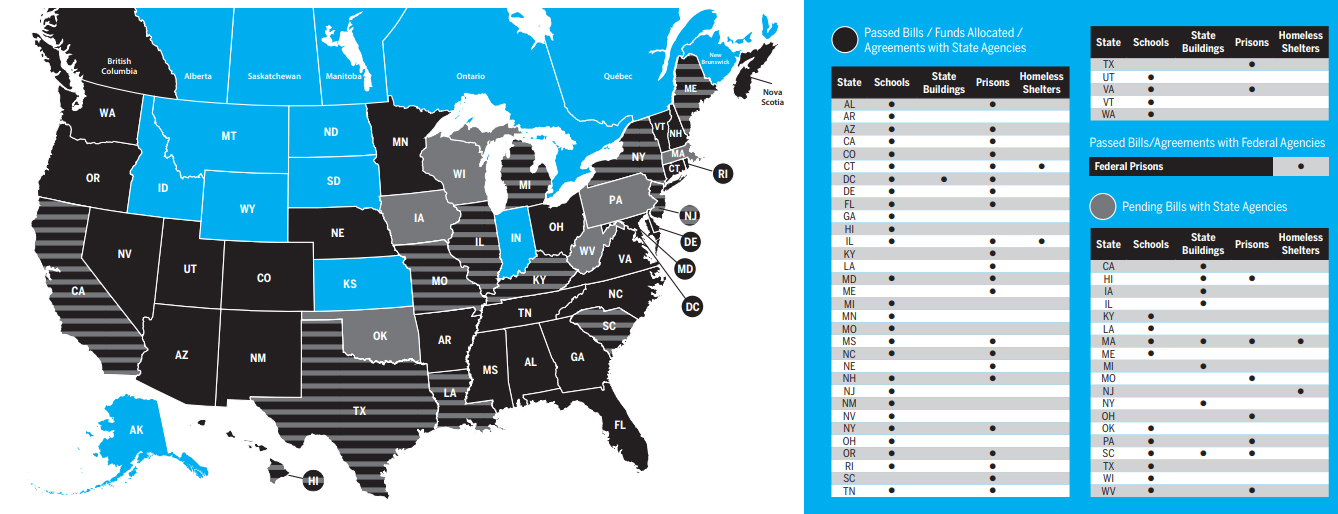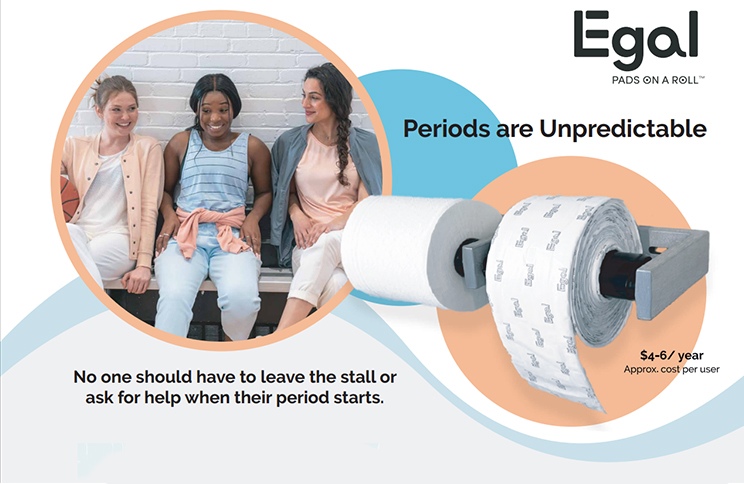From Policy to Practice: Facility Management in the Era of Menstrual Equity
In recent years, menstruation legislation has become a crucial facet of the broader conversation surrounding menstrual equity in the United States. Defined by the challenges collectively known as period poverty, the legislation addresses the lack of access to menstrual products, education, and hygiene facilities. Studies reveal this issue's profound academic and emotional impacts, particularly on students. With a notable emphasis on inclusivity, recent laws mandate schools to provide free menstrual products, recognizing the disproportionate impact on marginalized communities. The evolving legislative landscape reflects a commitment to ensuring equitable access for all menstruators, breaking down barriers to education, and fostering a society where periods are not a hindrance but an experience navigated with dignity.

Legislation surrounding menstruation rights in the United States has witnessed significant developments in responding to the challenges of period poverty. Numerous states have passed bills requiring public schools to provide free menstrual products to address this, recognizing the disparate impact on marginalized groups. States like California, Delaware, Illinois, Maryland, Nevada, Oregon, Rhode Island, and Washington have taken a comprehensive approach, mandating all local education agencies to offer free menstrual products in female restrooms, primarily for students in grades 6-12. These legislative efforts demonstrate a growing commitment to menstrual equity, fostering an environment where access to menstrual products is a fundamental right rather than a barrier to education and well-being.

As of the latest available information, several states in the US are actively considering legislation related to menstruation rights, reflecting an ongoing commitment to address period poverty and ensure equitable access to menstrual products. States such as Connecticut, Florida, Massachusetts, Minnesota, Missouri, New Jersey, Pennsylvania, and Vermont have introduced bills focused on providing free menstrual products in schools. These proposed legislations align with the broader trend of acknowledging the impact of period poverty on students' academic and emotional well-being. The emphasis on inclusivity and equity is evident, with states considering measures that extend beyond economic barriers, recognizing the diverse experiences of menstruators.
For more information about pending legislation, we recommend checking out the Period Partner page on Hospeco's website.
The Impact on Facility Managers
Facility managers face many challenges in following the laws that say they have to provide free menstrual products. They deal with money problems, figuring out how to get and store the products, and making sure everyone knows about them. This list breaks down the main issues they tackle, showing how complicated it can be for facility managers.
- Budgetary Constraints: Facility managers may grapple with financial challenges in sourcing and providing free menstrual products as mandated by legislation.
- Logistical Implementation: Ensuring consistent and widespread access to menstrual products across various facilities can pose logistical challenges, especially in larger organizations or campuses.
- Supply Chain Management: Securing a reliable and cost-effective supply chain for menstrual products, including restocking and storage considerations, becomes crucial.
- Educational Outreach: Facility managers may need to implement educational programs to inform users about the availability and accessibility of free menstrual products, fostering awareness and destigmatization.
- Facility Design Considerations: Adapting restroom facilities to comply with legislation may require adjustments in design and layout to accommodate the distribution of free menstrual products.
- Communication with Stakeholders: Facility managers may need to communicate transparently with building occupants, staff, and relevant stakeholders to ensure a smooth transition to compliance.
- Navigating Evolving Legislation: Facility managers must stay informed about amendments or updates to menstruation product legislation, ensuring ongoing compliance with evolving legal requirements.
New Product Spotlight: Egal Pads On A Roll

Egal Pads on a Roll are a revolutionary and convenient solution for managing menstrual hygiene. These pads, neatly rolled for easy dispensing, offer a user-friendly and eco-conscious approach to feminine care. With their thoughtful design, Egal Pads on a Roll ensure accessibility while minimizing environmental impact. The roll format allows for efficient storage and easy access, making them a practical and sustainable choice for those seeking a hassle-free and planet-friendly menstrual product.
Visit padsonaroll.com to learn more.
Hillyard Can Help You Comply With New Legislation
At Hillyard, we understand the importance of a well-rounded feminine hygiene program, and we're here to support you every step of the way. With representatives situated across the United States, we ensure local and personalized assistance in implementing a comprehensive program tailored to your needs. Our extensive product line includes a variety of tampons, maxi pads, dispensers, and waste receptacles, all designed to provide a seamless and reliable feminine care solution. Trust us to guide you through the process, drawing on our expertise and commitment to your satisfaction. To start the conversation and explore how Hillyard can enhance your feminine hygiene program, simply fill out the form below. We look forward to connecting with you and creating a solution that meets your specific requirements.
Frequently Asked Questions
What is the Menstrual Equity For All Act of 2023?
The Menstrual Equity For All Act was a proposed legislation aimed at addressing menstrual equity issues in the United States. Introduced by Congresswoman Grace Meng, the act sought to make menstrual products more accessible and affordable. Some key provisions included allowing states to use federal grant funds for free menstrual products in schools, providing incentives for colleges and universities to establish pilot programs, and requiring companies with over 100 employees to provide menstrual products free of charge.
What are the basic components of menstrual equity?
Menstrual equity ensures affordable, accessible, and stigma-free access to menstrual products. Key components include affordability, making products accessible in public spaces, comprehensive menstrual education, supportive policies, inclusivity for diverse needs, promoting eco-friendly products, and addressing health considerations. These elements collectively aim to create an equitable environment for individuals managing menstruation.
Why should menstrual equity be achieved?
Achieving menstrual equity is essential for several reasons. Firstly, it promotes gender equality by addressing a fundamental aspect of reproductive health. Secondly, it ensures that all individuals have dignified and affordable access to menstrual products regardless of socioeconomic status. Moreover, it positively impacts education and work, reducing barriers hindering academic and professional participation. Lastly, menstrual equity contributes to breaking the stigma surrounding menstruation, fostering a more open and supportive societal attitude toward a natural and universal aspect of human biology.
What are the benefits of menstrual equity?
Menstrual equity delivers vital benefits, fostering gender equality and enhancing the well-being of individuals. Providing dignified access to affordable menstrual products supports education by reducing absenteeism and creating inclusive environments. In the workforce, it facilitates greater participation by eliminating menstruation-related barriers, contributing to economic empowerment. The concept also actively challenges societal stigma surrounding menstruation, fostering open conversations and reshaping perceptions. Additionally, ensuring access to safe and hygienic menstrual products positively impacts the health and overall well-being of individuals, marking a crucial step toward creating a more equitable and supportive society.